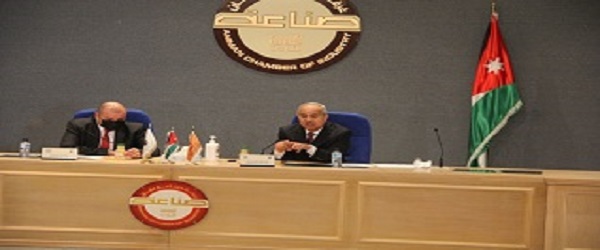13-Feb-2021

The speaker of the House of Representatives, Lawyer Abdel Moneim Al-Oudat, called for the diagnosis of industrial and commercial realities, in preparation for developing solutions to serve the national economy and achieve comprehensive development.
During his meeting on Saturday, members of the boards of directors of the Jordan and Oman Chambers of Industry played a role in the role of the industrial sector during the Coronavirus crisis in covering the basic needs of citizens.
He stressed that the protection of domestic and foreign investments is an issue for which there is no room for complacency, as a fundamental pillar of the recovery of our national economy, contributing to the problem of poverty and unemployment, opening the way to economic and social advancement, and the development of industries such as food, pharmaceuticals and agricultural techniques.
Al-Oudat said that the imbalance is not so much the legislation governing investment as it is about application, implementation and the ability to understand it by investment managers, stressing the importance of overcoming administrative and bureaucratic challenges that hinder investment.
The principle of the rule of law was the guarantor of the rights of all parties, the integrity of the State, its institutions, its achievements and the future of its generations, which explained His Majesty the King's continued assertion that the principle of the rule of law was a red line, which could not be compromised by anyone, namely, the separation of all and in every matter or issue.
He called on jordan's industry to develop a protocol that redefines the concept of community responsibility and develops perceptions that contribute to the challenges facing the industrial sector, stressing the Council's keenness to achieve economic security for all investment establishments through its oversight and legislative role in dealing with any disruptions to investment activities.
He stressed that the House of Representatives is open to the legislative authorities and listens to all opinions, concerns, problems and challenges facing different sectors.
He called for the definition of public-private partnership to be defined on the basis of participatory thinking, planning and implementation and responsibility for the consequences of that partnership.
"We are aware of the suffering of the industrial sector in our country as a result of closures, bans and public safety measures, a situation that continues to exist and we do not know for how long, but we know that the equation between public safety and the continuation of the economic process and the general vitality of the state is something that we may live with for a long time," he said.
Fathi Al-Jagbir, president of the Jordan and Amman Chambers of Industry, said the industrial sector is always looking to cooperate with the House of Representatives to reach common ground on the challenges it faces, highlighting the importance of Jordanian industry and its key role in employment and job creation, and supporting the engines of economic growth.
He pointed out that the industrial sector, which accounts for a quarter of GDP, stressed the need to resolve the issues that concern Jordanian industry and remain outstanding for many years, foremost of which is the price of energy, which is the highest among the countries of the world, as well as the subject of reciprocity to countries that place restrictions on the kingdom's exports to their markets.
He pointed to the significant role played by the industrial sector during the Coronavirus pandemic by providing many goods, food products, medicines, medical supplies and sanitation needed by the local market in large quantities and fixed prices, in addition to supporting national efforts in combating the epidemic.
He stressed the need to follow his Majesty King Abdullah II's example in supporting local investment and development through his field visits to a number of factories and inviting His Majesty to apply the slogan "self-reliance" on the ground.
For his part, Khaled Abu Hassan, chairman of the parliamentary economic and investment committee, said that the committee is open to various economic sectors through its recent meetings, pointing out the great role played by the industrial sector in supporting the national economy and creating jobs.
Mp Khaled Al-Basanji said the industry is the backbone of the economy and must be protected and all possible support should be provided, suggesting that there should be a hotline between the council and the Jordan Chamber of Industry to address any issues of concern to industrialists.
For his part, Mp Dr. Khair Abu Saeliek pointed out that the multiplicity of regulations related to the investment law hinders its implementation on the ground, calling for the drafting of a plan for economic recovery in partnership between the House of Representatives and the industry of Jordan.
Members of the boards of directors of the Jordan and Oman Chambers of Industry noted some of the issues and challenges facing the industrial sector, stressing the need for continuous and vital communication with the House of Representatives to help Jordanian industry in the issues it faces, particularly in the legislative aspect.
They stressed the importance of activating the Investor Protection Unit of the Public Security, unifying investment references and regulatory bodies and facilitating investors, and to have any future contact with industrial facilities through the Jordan Chamber of Industry, and the creation of a unified licensing law and the development of the system of economic legislation.
The meeting was attended by First Deputy Speaker of the House of Representatives Ahmed Safadi, Second Deputy Haitham Ziadin, Assistant President Yazan Shadifat and Dina Al-Bashir, Chairman of the Economic and Investment Committee Khaled Abu Hassan, Finance Committee Member Dr. Khair Abu Saeliek, and Member of the Economic and Investment Committee Khaled Al-Basanji.
×
![]()